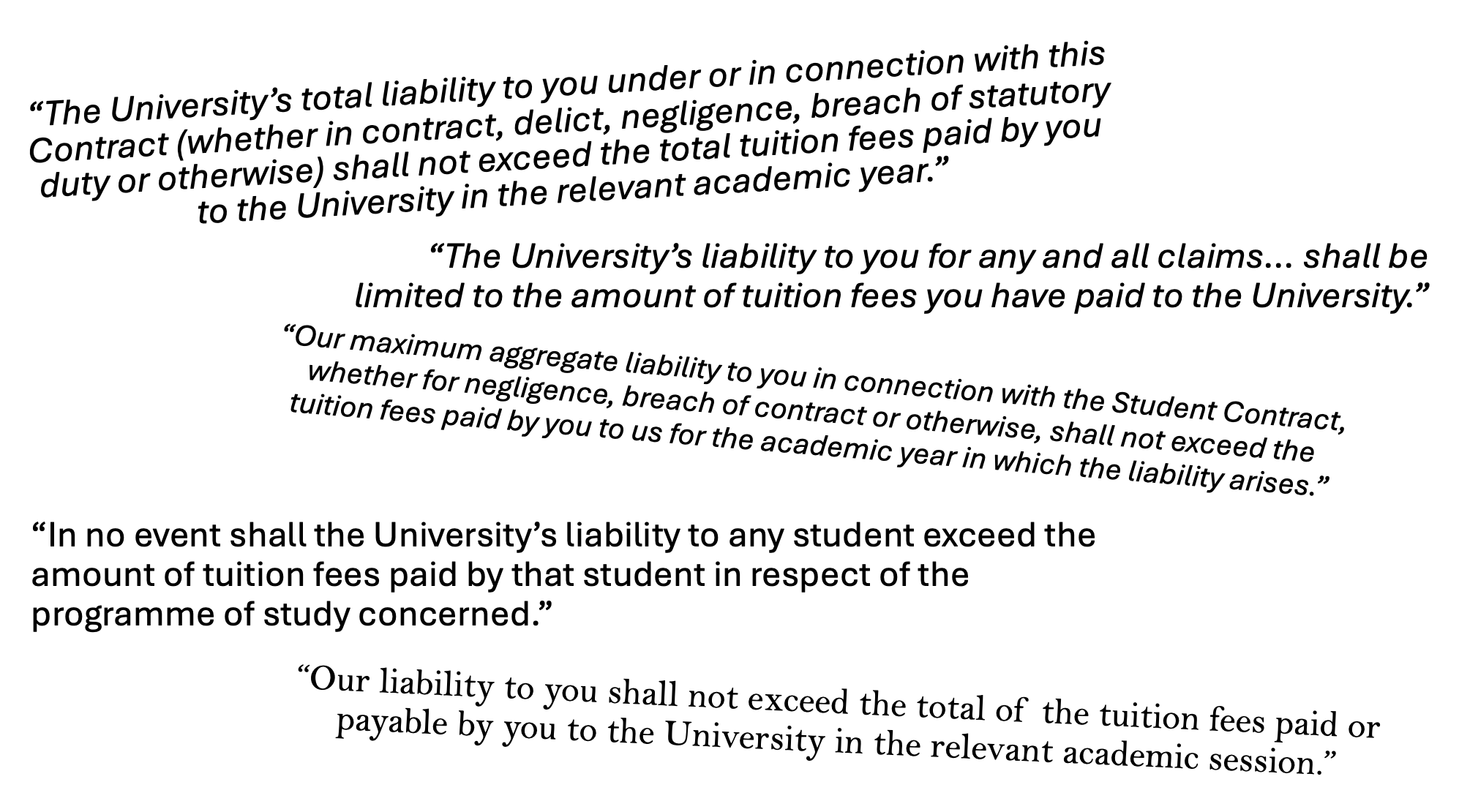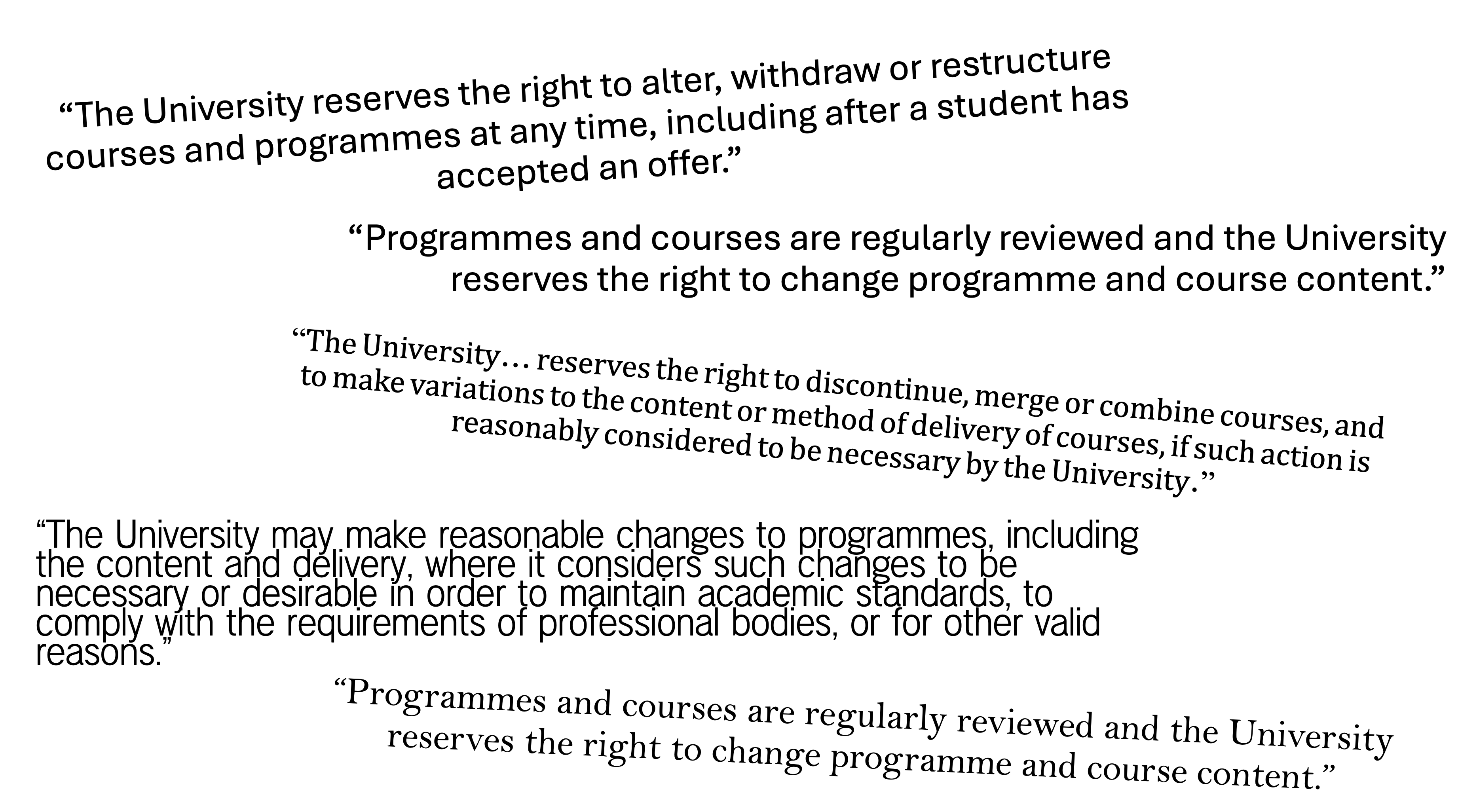It’s easy to trace differences in culture back much further – arguably right back to Bologna in 1088, and the Rectors of the Ancients in the 15th Century.
But at the very least since 2003, students’ unions in England have looked North of the border jealously at a country so committed to student partnership that it created a statutory agency to drive it.
Partnership at all levels thrives when there’s will, time, and frankly, money. It’s tougher to reflect the principles of students having power when times are tight – when the excel sheets no longer add up, when restructures have to be planned, and when cuts have to be crafted to the facilities and services that students have been inputting on for years.
Beyond the potentially apocryphal stories of truly student-led institutions in ancient times, students in any system are bound to be treated as, and regard themselves as, at best junior partners – with, both at individual and collective levels, a significant power asymmetry.
In such scenarios, when leaders spend their days choosing between any number of awful options, it’s often going to be the least institutionally risky path that’s taken. And the danger is that students – who previously might have relied on partnership to secure their interests – now really need protection instead.
I spend quite a bit of time here lamenting the implementation of protection measures for students in England. But in conversations with students and their leaders in Scotland, I’m now finding myself repeatedly reflecting on the fact that at least, in England, there are some.
3 months to open your email
Take complaints. The Office of the Independent Adjudicator (OIA) doesn’t always generate the answer that student complainants would like – it often feels too distant, and at least temporally, hard to access.
It also has a tendency to seek resolution when it’s sometimes justice that should prevail – and increasingly feels like providers are paying students off (often with NDAs for non-harassment complaints) before they get there.
But in Scotland, students have to use the Scottish Public Services Ombudsman (SPSO). As I type, “due to an increase in the volume of cases” it is currently receiving, there is a delay of 12 weeks in allocating complaints to a reviewer.
Some comfort that will be to the international PGT who has cause to complain in month 10 of their studies, only to have to encounter a complaint, an appeal, and then a further 12 weeks just to get the SPSO to open their letter. UKVI will have ensured they’re long gone.
It’s clear that few get as far as the SPSO. When it investigates a complaint, it usually reports its findings and conclusions in what it calls a decision letter – and these findings are published as decision reports. Since May 2021, just ten have been published.
Either students in Scotland have much less to complain about than their counterparts in England and Wales, or universities in Scotland are much better at resolving complaints, or this is a system that obviously isn’t working.
Never OK
Then there’s harassment and sexual misconduct. Just under a year ago Universities Scotland’s update on anti-harassment work suggested a system of protection that’s patchy at best.
37 per cent of institutions weren’t working with survivors to inform their approach, 21 per cent didn’t have policies allowing for preventative suspension where necessary, and only 71 per cent of institutions had “updated their policies” following guidance from UUK on staff-student relationships – which could still mean all 19 universities are permitting staff to pursue students.
Universities Scotland acknowledges that most identify funding as a barrier, but England’s regulator makes clear that providers “must” deploy necessary resources, with higher-risk institutions expected to invest more. If you can’t fund student safety properly, perhaps you shouldn’t be operating is the message in England.
And there’s no sign that Scotland will be taking part in the prevalence research that’s been piloted in England.
Cabinet Secretary Jenny Gilruth’s praise for Scotland’s “partnership approach” suggested either complacency or a failure to grasp that Scotland is sliding toward being significantly less robust than England in protecting students. When partnership fails to deliver safety, protection becomes essential – and on harassment, it feels like Scotland is failing to provide either adequately.
Best practice should not be voluntary
Or take mental health. While Wales has responded to parliamentary concerns about consistency by accepting recommendations for a “common framework for mental health support” backed by registration and funding conditions, Scotland continues to rely on voluntary approaches that deliver patchy outcomes.
The Welsh government’s response to its Children, Young People and Education Committee shows what serious commitment looks like. New MEDR registration conditions will require clear expectations for student wellbeing, supported by data collection requirements, evaluation frameworks, and crucially, funding considerations built into budget allocations.
There’s partnership rhetoric – but it’s partnership backed by regulatory teeth. Wales has grasped what Scotland appears to miss – that “best practice should not be voluntary” when student lives are at stake, as one bereaved parent told Westminster’s Petitions Committee.
The Welsh approach is set to recognise that students need “parity of approach” and “consistency between departments, institutions, and academic teams” – something that purely voluntary frameworks cannot deliver.
Scotland’s reliance on institutional goodwill for mental health provision increasingly looks naive. Maintaining flexibility for institutions to design services suited to their contexts, is one thing – but Wales will ensure baseline standards that students can depend on regardless of which university they attend.
The contrast is stark – Wales will treat student mental health as a regulatory priority requiring systematic oversight, while Scotland appears content to hope that partnership alone in a context of dwindling funding will somehow deliver consistency. When partnership fails to protect the most vulnerable students, Wales will have built backup systems – Scotland has built excuses about funding pressures that Welsh universities face too.
Promises promises
Then there’s consumer protection – or, as I like to rebrand it, delivering on the promises made to students. It’s easy to assume that students in Scotland aren’t covered – but plenty do pay fees, and those that don’t are supposed to be protected too.
But over two and a half years since the Competition and Markets Authority revised its guidance to universities on compliance, there seems to be a nationwide problem. Of the 16 universities I’ve looked at in Scotland, 15 still include contractual terms limiting liability in the event of a strike involving their own staff – something CMA has advised is unlawful, and which OfS is effectively enforcing in cases like Newcastle.
In a year when strikes are more likely, why should students in Scotland not be afforded the same rights to the education they’ve signed up for than their English counterparts?
The CMA also bans clauses that limit compensation for breach of contract to the total paid in fees – something that would be very attractive in Scotland for obvious reasons. Yet 14 of the country’s universities continue to publish contractual terms that apparently allow them to with impunity. Several have highly problematic clauses on in-contract fee increases too.

And CMA’s guidance on “variation clauses” – that should not result in too wide an ability to vary the course or services that were offered when students signed up – looks like it’s been flouted too.

I’m no lawyer, but most universities in Scotland seem to be affording themselves the right to pretty much change anything and everything – and when finances are as tight as they are, that means students and their complaints about cuts can be bottom of the risk register, if they feature at all.
You’re the voice
Or take student voice itself. The mandatory Learner Engagement Code required by the Tertiary Education and Research (Wales) Act 2022 could be transformative – moving from “should” to “must” with genuine comply-or-explain mechanisms, protected status for student representatives, and mandatory training on rights and responsibilities for all students. Or it could emerge as something weak and vague, disappointing everyone who fought to get student engagement into primary legislation.
But at least there is one. At minimum, Wales recognises that student partnership requires legal backing, not just goodwill that evaporates when finances get tight. Scotland’s partnership model, for all its historical reputation, increasingly looks like an expensive way of avoiding the hard work of building systems that actually protect students when partnership fails.
However flawed, students in England now have new rights over freedom of speech – including a right to not be stopped from speaking on the basis of “reputational impact” on the provider. Several Scottish universities seem to have extraordinarily wide exemptions for “disrepute” and “reputation” that are almost certainly in breach of the Human Rights Act.
You could even, at a stretch, look at cuts and closures. For all the poor implementation and enforcement of a system designed to protect students when their campus, course, university or pathway is closed in England, at least the principle is in place. Student Protection Plans are required in Scotland by SAAS for private providers – but not of universities. Why?
We voted against Brexit
I could go on. Scotland regularly positions itself as more European than England, particularly in higher education where the “partnership approach” is often presented as evidence of continental-style governance. Scottish politicians invoke European models when defending their policies, suggesting Scotland’s collaborative approach mirrors sophisticated systems across the continent.
Yet European student rights frameworks put Scotland to shame. In Serbia, students have the legal right to nutrition, rest and cultural activities. In Sweden, students enjoy the same workplace protections as employees under the Work Environment Act. In Lithuania, there’s a minimum amount of campus space allocated per student by law, and student representatives hold veto power over university senate decisions – if they use it, a special committee reviews the issue and a two-thirds majority is required to override.
In Latvia, students’ unions receive at least 0.05% of the annual university budget by law, with legal rights to request information from any department on matters affecting students. In Poland, students have guaranteed rights to study programmes where at least 30 per cent of credits are elective, and universities must consult student governments when appointing managers with student affairs responsibilities. Student protests and strikes are specifically protected, with mediation rights.
In the Netherlands, universities must inform the national confidential inspector whenever staff may have engaged in harassment involving students – and any staff hearing about allegations must report them to management. Spain mandates every university has an independent ombudsperson with statutory reporting duties. In Croatia, universities are legally obliged to provide students’ unions workspace, co-finance their activities, and offer administrative support. And Austrian students make up significant proportions of curriculum committees by statute, ensuring programmes remain flexible and career-relevant.
Can I get the Bill
It’s not as if there isn’t a legal vehicle that could improve things. The Tertiary Education and Training (Funding and Governance) (Scotland) Bill is weaving its way through the Scottish Parliament as we speak – but it couldn’t be weaker in protections for students if it tried.
- Section 8 allows the new Council, when conducting efficiency studies, to consider “the extent to which the needs and interests of students are being met” and then issue recommendations to universities and colleges. But recommendations are not binding.
- Section 11 amends the 2005 Act to require the Council, in exercising its functions, to “have regard to the desirability of protecting and promoting the interests of current and prospective learners.” Again, this is a duty on the Council, not directly on universities, and is about regard rather than enforceable standards.
- Section 18 allows Scottish Ministers to designate private providers so that their students can access public student support. That’s a consumer-style protection, but it’s about access to funding rather than quality or rights.
- Section 19–20 updates the rules around how student support is administered and delegated — but again, that’s more about machinery than protections.
There’s no new regulatory framework for how universities behave towards students (on contracts, teaching quality, complaints handling, etc.). There are no rights conferred directly on students — no duty of fair treatment, no consumer protection-style obligations, no statutory complaints rights.
Universities themselves are not made subject to enforceable duties in the Bill, beyond existing general oversight via the Funding Council. And while the Council can give guidance (section 10) and issue recommendations (section 8), institutions are only required to “have regard” rather than comply.
Cakeism in Scotland
Models of student partnership have served Scotland well over the decades – and should continue to. After all, learning outcomes take two to tango – and that’s true from the classroom right up the boardroom.
But right now here in 2025, partnership often feels like a luxury for when rivers of money start flowing back in – and even the most well meaning and moral SMT or Court has a duty to protect the institution before it protects its students.
Ultimately, partnership and protection should not feel like mutual exclusives, or something a country should choose. It’s perfectly possible, and in the current funding climate, deeply desirable, for students to have both.
Scottish ministers – through a new section of the Funding and Governance Bill – should legislate to make it so.













